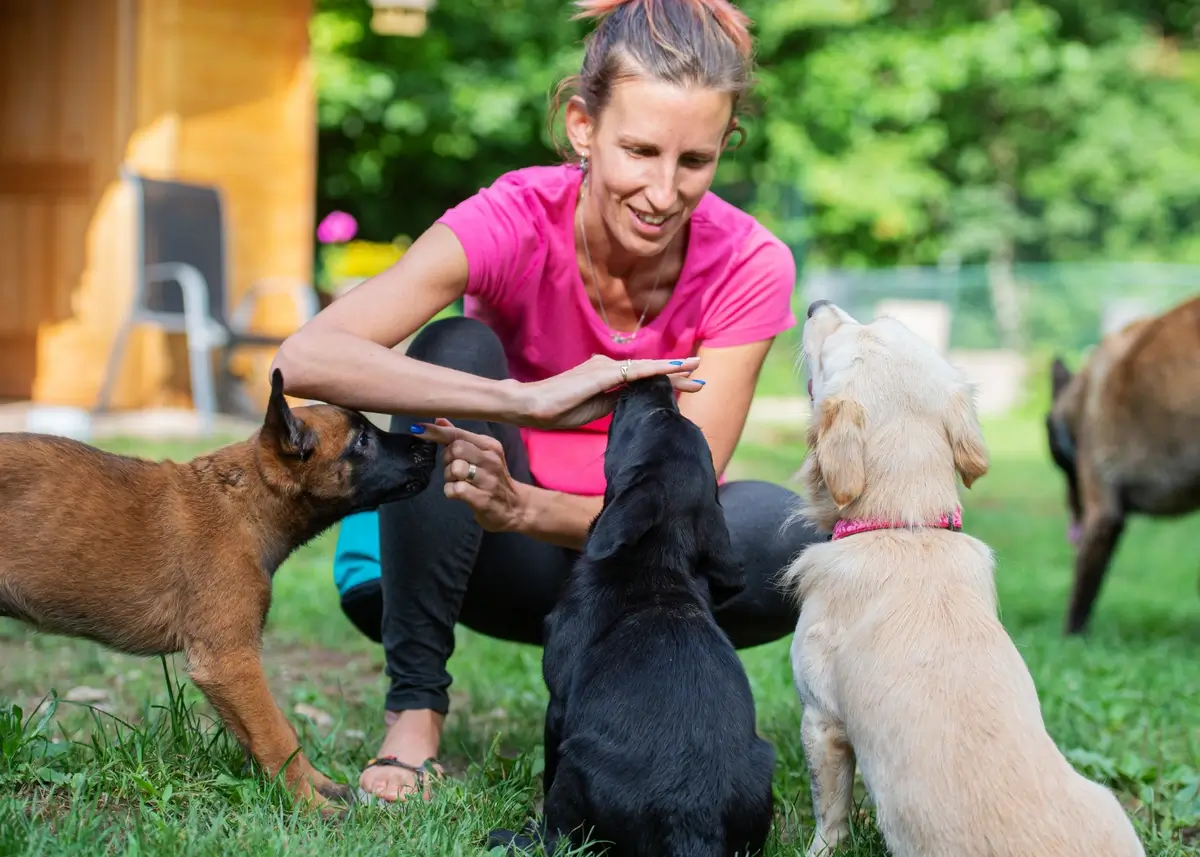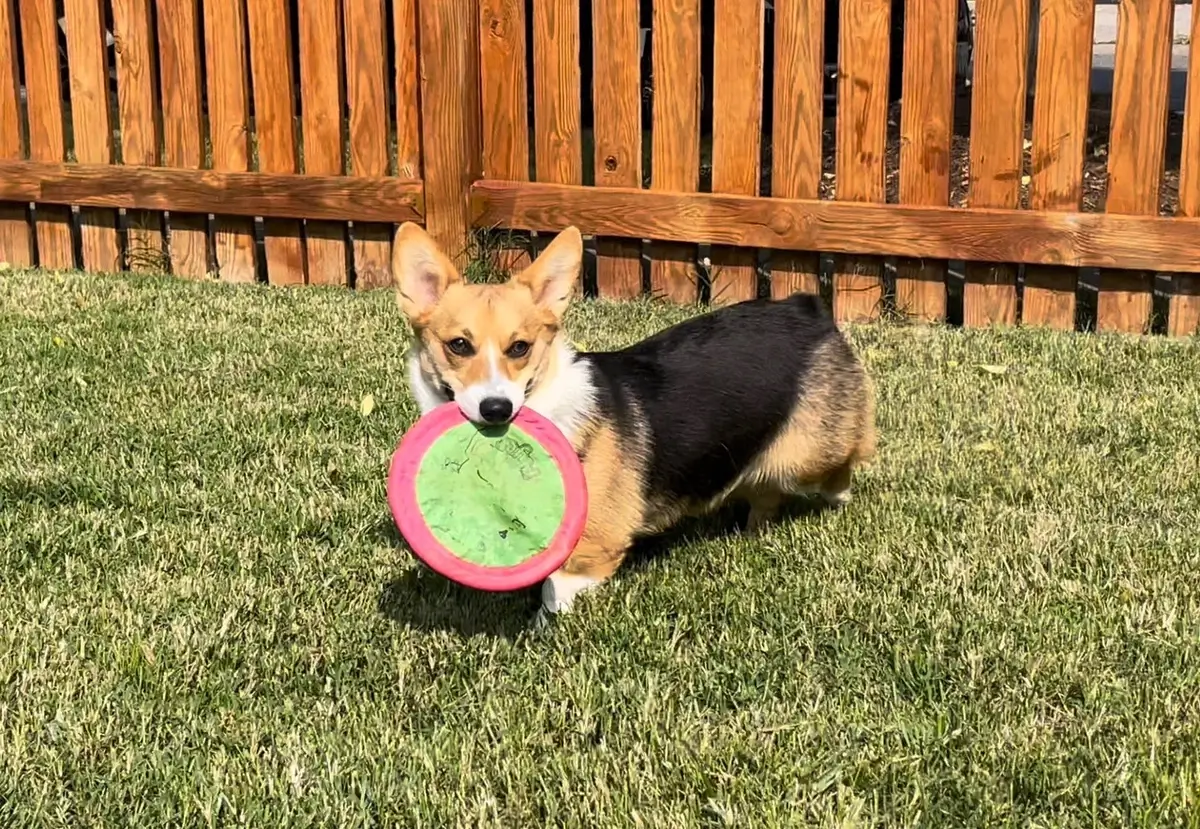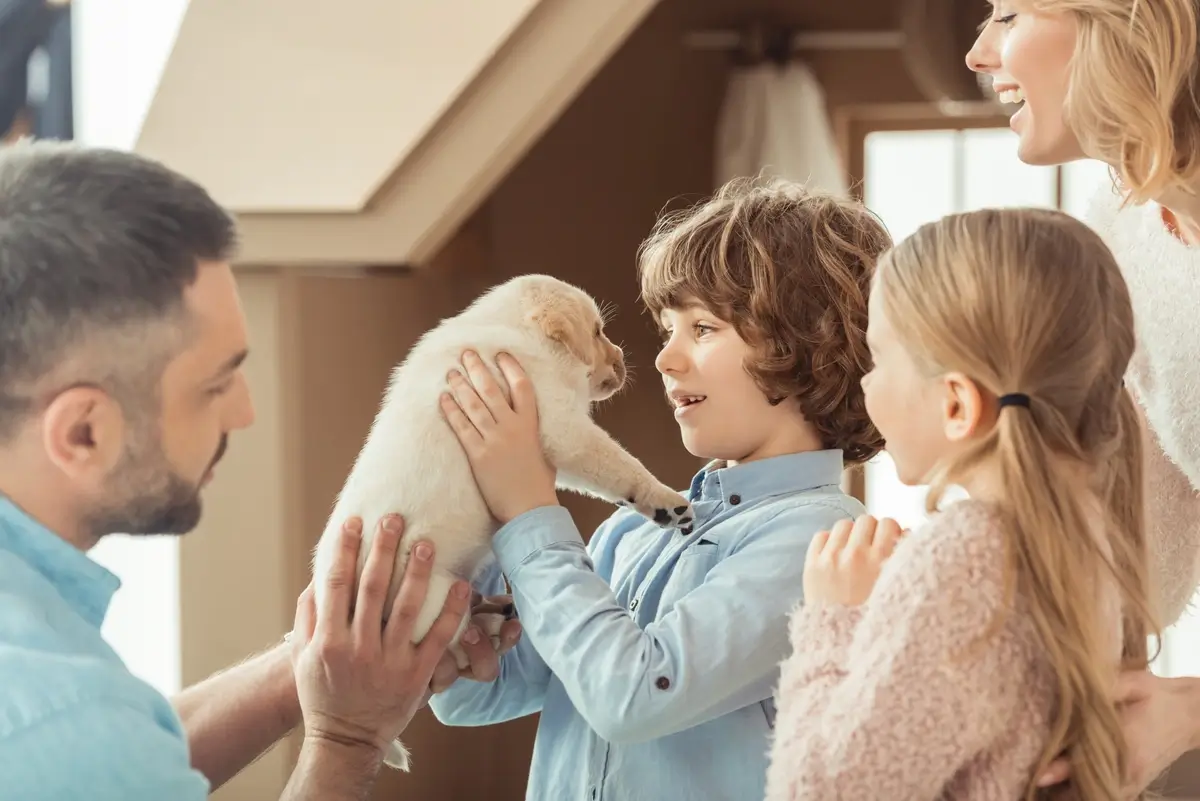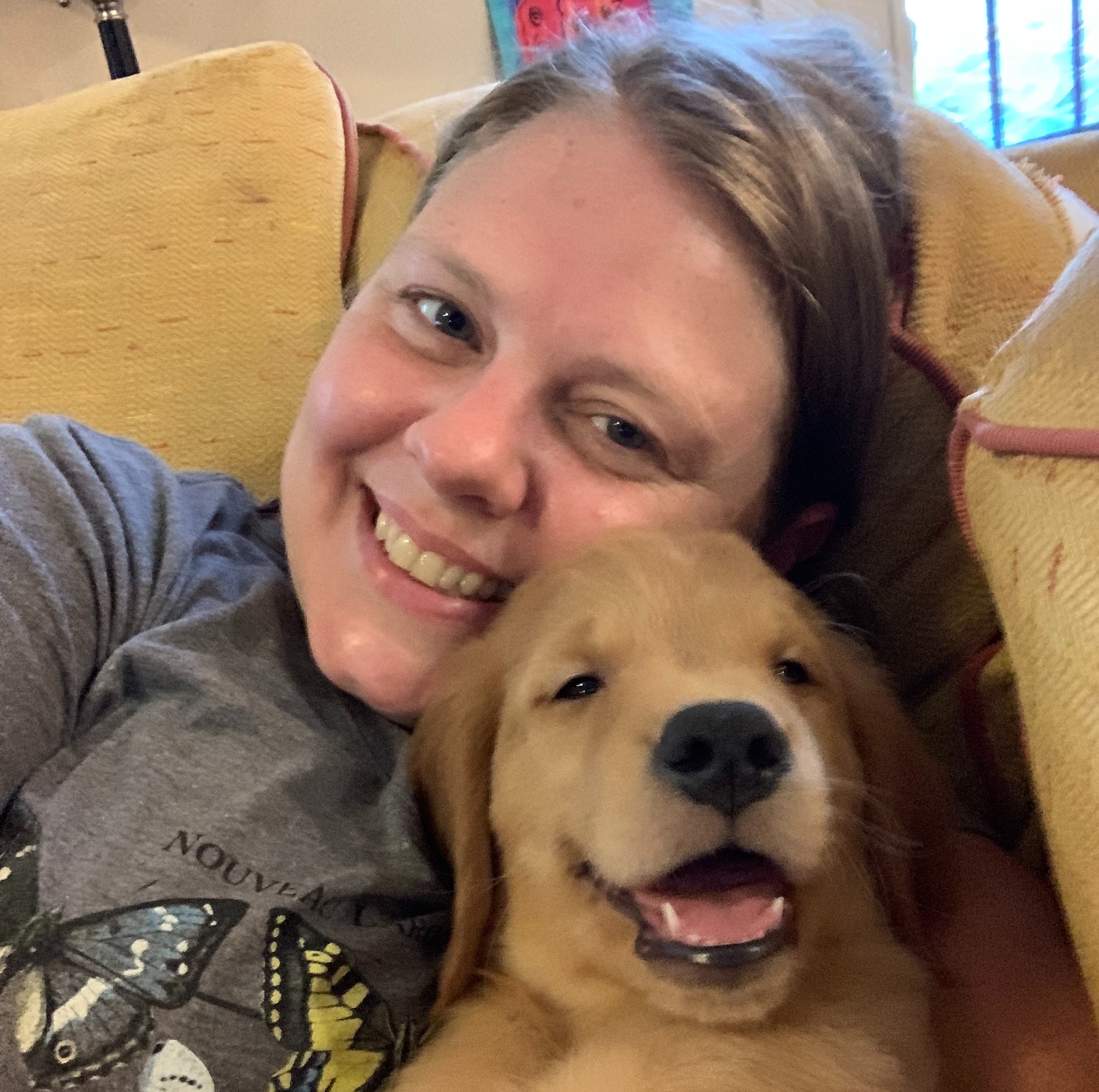Puppies are adorable balls of fluff that bring joy to our lives. The bonds we create with our puppies during those first few months (and their lifetime) are priceless! You want to experience the unconditional love of a puppy, but where to start?
When adopting a puppy, you should questions to ask yourself to see if you are ready for a puppy or not. Some of these questions will be easy, and others will require you to take a long, hard look at your preferences and lifestyle.
When you’ve gathered your answers, you’ll begin looking for trustworthy places to adopt your puppy. Turning to Pawrade for your puppy adoption journey is a smart choice! We partner with breeders we hand-select and pre-screen to see if they are a great fit for our robust program promising to uphold our highest standards. We’ve done the heavy lifting for you! All of our breeders have favorable answers to questions to ask your breeder when searching for puppies for sale, so you don’t have to spend your time interviewing a long list or waiting for a litter to become available.
At Pawrade, we ask that you fill out a buyer questionnaire, an interest survey that helps both the Puppy Concierge Team and your breeder get to know you before completing a puppy adoption. We ask questions about your property type, details about your household, your reasons for wanting to adopt this particular puppy, and other factors that help determine if you and your puppy are a great fit for one another.
By asking specific questions, we also reduce the chance that a puppy is not the best match for you, whether they are a bit more active than your lifestyle is right now, your apartment won’t accept your chosen dog breed, or you end up with a giant dog that needs lots of space to roam in a tiny urban apartment. We ask thorough questions to protect the puppy by giving it the best life possible.
Let’s explore what questions breeders ask potential pawrents and the reasoning behind them to ensure your puppy is the one for you.
Our Buyer Questionnaire: Pawrade Breeders Want to Get to Know You
Just like you may have questions for your breeder, your breeder will also ask you questions to ensure your chosen puppy can seamlessly fit into your current lifestyle. Think about it like an interview where you both are free to ask important questions to determine your and your puppy’s compatibility and success.
Property type: Where do you live?
Where you live can matter greatly as to which dog breed is right for you. Do you live in an apartment, condo, townhouse, single-family household, or farm? Breeders check for adequate indoor and outdoor space, legal stipulations, and other factors impacting a puppy’s life based on your living environment.
Breeders want to match their dog breed’s characteristics with your overall lifestyle and living situation. Let’s say you are interested in an Australian Shepherd, Great Pyrenees, or Border Collie and live on a farm. You’d love to train your puppy to assist with livestock. Based on the fact that your living space and lifestyle match what an active herding breed requires, your breeder will move on to other questions, happy to see a puppy go to a home where it will thrive according to the breed’s needs.
You may be a retired senior who has downsized to a condo from a larger house. You’re home quite a bit and are looking for a small apartment-friendly companion dog that fulfills your lease requirements, and you do not mind if your puppy wants to be right by your side or in your arms most of the day. You also have allergies, so you should find a hypoallergenic dog that does not shed much. You like to live life at a slower pace and take a stroll around the neighborhood after dinner, so a lower-energy dog that needs people around for a large portion of the day is a great fit for you. A portable dog would suit your lifestyle of short trips around town. Your breeder and Puppy Concierge Team might recommend a small low-maintenance dog breed or one of the best dog breeds for apartments such as a Maltese or Cockapoo rather than a large, furry dog requiring lots of maintenance.
State and municipality dog laws differ for canines living within the jurisdiction, so familiarize yourself with them to see if there are any blanket breed restrictions where you live. For example, several states have laws regarding wolf hybrids and other breeds.
Do you have a yard?
While many rescues and shelters require you to have a fenced-in yard, Pawrade puppies do not have this requirement across the board as the default for all puppies. It’s useful to know if you do have an enclosed space for a few reasons. Puppies need plenty of outside space to roam, relieve themselves, and be active. However, certain breeds are “Houdini dogs” and love to escape and roam. A breeder can see if your fence is tall enough for jumping or if this breed can shimmy under the fence or through tight openings. For example, even though they are only about a foot tall, a Jack Russell Terrier can clear a 5-ft. fence with their Tigger-like legs. Likewise, Siberian Huskies are the ultimate escape artists. Rather than being defiant or making you mad on purpose, they’ll see it as a mentally stimulating problem to solve by breaking free, “laughing” at a four-foot-tall fence, and running around the neighborhood to their hearts’ content making friends wherever they go. Breeders will note nuances like these when asking about owning a fence.
What if I rent?
Renting is not an automatic “No” from breeders. Rather, they want to see if your physical and legal situation is the best fit for the puppy you’ve got your eye on. The most important thing you need to do before looking for a puppy to adopt is to carefully read over your entire lease agreement and know the pet policy thoroughly. An apartment lease pet policy outlines essential details such as the number of pets allowed, weight restrictions (most places allow dogs under a certain weight), specific breed limitations, protocols for handling situations like dog conflicts and excessive barking, and clauses relating to potential damages caused by pets. Many places will require a non-refundable pet fee and a monthly add-on fee for pets.
Failure to comply with your rental’s pet policies can only end in trouble and even heartbreak. Consequences for disregarding the pet policy can lead to various issues, including strained relationships with neighbors, conflicts with the landlord, involvement of authorities, and ultimately, the risk of eviction. Therefore, you must abide by the established guidelines and be a responsible puppy owner to maintain harmony within your living community and ensure a positive renting experience.
Once you determine your puppy fits all the guidelines and you’ve let your landlord know, take pictures of what your house looks like inside and outside (if you have a yard) before you bring a puppy home. Remember that puppies can be destructive, chewing baseboards, clawing doors, and relieving themselves inside. Landlords often have expectations regarding the upkeep of outdoor spaces, such as maintaining a tidy yard free of dirt patches caused by pacing dogs or urine stains on the grass. Some landlords may prohibit using tie-outs or leaving your dog unattended outside, even in a fenced-in yard. These indoor and outdoor pictures can serve as valuable evidence in case of any discrepancies or disputes regarding damages when you move out.
Number of people in your household?
Pawrade does not require a certain number of people in a household to adopt a puppy, but it does help the breeder understand what your puppy may encounter when it is growing up in your environment. If you live with a family or roommates, who will be the person or people responsible for the puppy’s care? Will you split all duties, and can people be trusted to follow through? If you live alone, do you have a plan for where to place your dog when you are unable to care for it due to going out of town or other circumstances? Knowing how many people are in the household can also help inform a breeder if the dog breed does well with a small group of people or will thrive in the fun chaos of a busy home.
In addition to the number of people, breeders may ask how frequently someone will be at home to stay with the puppy. Certain breeds are more independent than others and can stay alone for several hours. However, many companion breeds are considered “Velcro dogs” and thrive when they are around people. If these dogs are left alone, it can lead to severe separation anxiety in puppies.
Are there children in the household?
Children who grow up with pets learn responsibility, experience unconditional love, and share a deep bond with their puppies. However, while there are family-friendly dog breeds that make great pets, there are others who do better in a household either with older children or no children at all. Some dog breeds are mellow and patient when children play roughly or accidentally pull on their fur such as Newfoundlands and Bernese Mountain Dogs (often called “nanny dogs”). Other dog breeds do not tolerate boisterous children nor do well with young children who have not learned boundaries yet or how to safely treat a puppy. Even if a little dog loves children, their tiny size may not be the best for rambunctious kids when safety is involved.
Your puppy’s breeder will help you determine if the dog breed you chose is generally compatible with children and be able to give recommendations and tips from past families and their own knowledge of the breed. Regardless of the dog breed you choose, always introduce your puppy to your children under supervision to make sure everyone has a fun, safe time.
Does anyone in the home have allergies?
You may fall in love with a particular dog breed while doing your research. You should always try to be around the dog breed you are considering to find out if you are allergic to this particular dog or not before you commit and discover your allergies in an unfortunate way!
While there are no true hypoallergenic dogs, some dog breeds are great choices for those suffering from allergies because they have low dander and hair instead of fur. Hypoallergenic puppies can be purebred or usually mixed with a Poodle to create a -doodle or -poo dog in its name. Allergy-friendly Doodle mixes and purebreds are wonderful choices if you are allergic to dogs. Purebred dogs with hair instead of fur include Yorkshire Terriers, Shih Tzus, Portuguese Water Dogs, Miniature Schnauzers, and more. Popular Doodle mixes include Mini Goldendoodles, Cavapoos, Bernedoodles, and others.
If you are interested in a Doodle dog, the first-generation cross cannot guarantee which parent side shows more than the other due to genetics. This means you may have a dog that indeed does shed and contains possibly more dander than expected. If you have severe allergies, look for a Doodle mix with a multi-generational lineage.
Why do you or your family want a dog?
A responsible breeder will want to know your intentions to get a puppy. This allows them to gauge if your answers are sincere and look for any red flags or points needing guidance or further conversation.
First-time puppy owners are usually very excited to bring a puppy into their home, but enthusiasm will only go so far when the reality of owning a puppy settles in. Some dog breeds are amazing for first-time dog owners, while others require a more experienced owner with the right skill set to provide the puppy with what it needs.
Breeders will also look for potential red flags that would impede a puppy from living its best life according to the breed’s needs. One example that could concern a breeder is this situation: If a person or family lives in a small apartment, leads a fairly sedentary lifestyle, and doesn’t have a lot of time during the day and wants an Australian Cattle Dog/Blue Heeler or Dalmatian, the breeder will probably express concern. If you live a sedentary lifestyle, you should not adopt a high-energy breed in hopes that you will change how you live; select one that matches your household’s vibe as it is currently. Likewise, if you’re on the go, love adventures, and are active daily, you may not want a dog known for being chill and even lazy like an English Bulldog or Basset Hound that’s better suited to a slower pace. You also wouldn’t want to choose a dog that cannot get too overstimulated or worked due to their short snouts and potential breathing issues and take them on a long hike.
In addition, sometimes people flat-out want a dog for the wrong reasons. Never get a particular dog breed as a status symbol or fashionable accessory. Another thing never to do is to give a dog as a gift for someone who is unaware they are receiving a live animal as a gift requiring a lifetime commitment, unable to care for the dog properly, or doesn’t want a dog in the first place.
When breeders ask why you’d like a dog, they may also go over how to be a financially responsible dog owner. The costs of raising a dog do not stop the minute your initial purchase concludes – you’ve only just begun your journey and need to have a plan for how to afford both regular care and emergency care.
When you adopt a puppy through Pawrade, we offer 30 days of MetLife insurance to get your puppy started on coverage for some medical issues. Pet insurance and various care plans can help mitigate anticipated and emergency expenses. Your breeder can also share common health concerns of your specific breed to help you prepare for possible treatments needed.
Can you take this puppy in good faith?
You may notice our statement that says, “I consent that I have never been criminally convicted nor am I under investigation for any offense related to abuse, animal cruelty or negligence.” Breeders and Pawrade must do due diligence to ensure every home is a safe home with loving puppy owners.
Got Questions About Adopting a Puppy? Pawrade Has Your Answers
The puppy adoption process can be a long one and leave you with even more questions than you had coming into the process. You don’t have to search for puppies for sale alone! Pawrade has made the pet adoption process a smooth, secure experience. We do all the hard work finding, screening, and selecting trustworthy, reputable breeders so you can concentrate on preparing for a puppy. Our Puppy Concierge Team specializes in helping you find the perfect four-legged companion that fits you and your family’s lifestyle and requirements. We can’t wait to hear from you!



